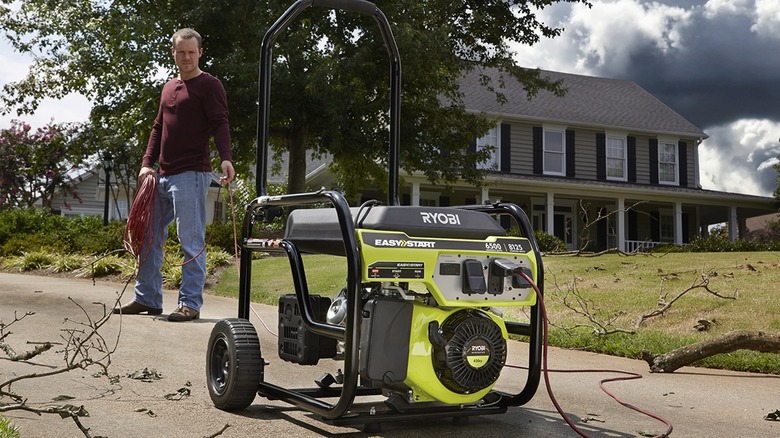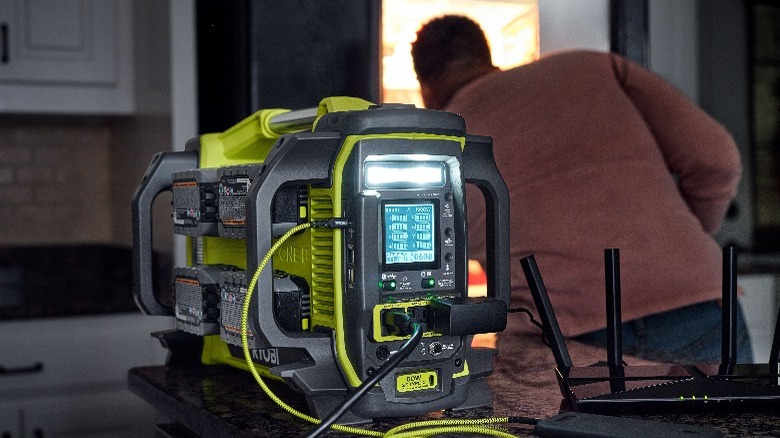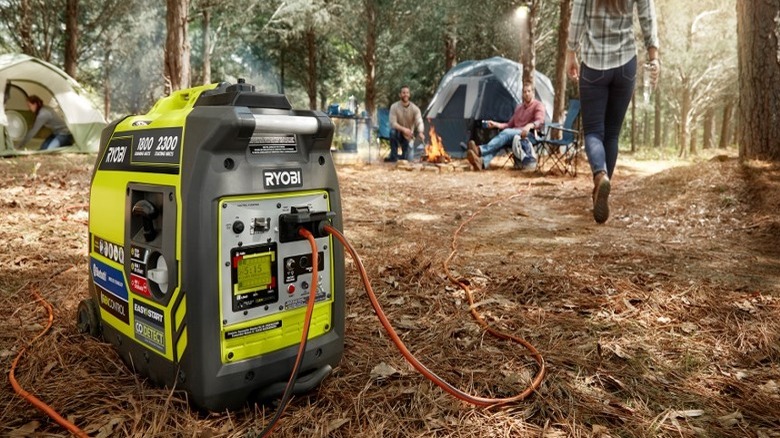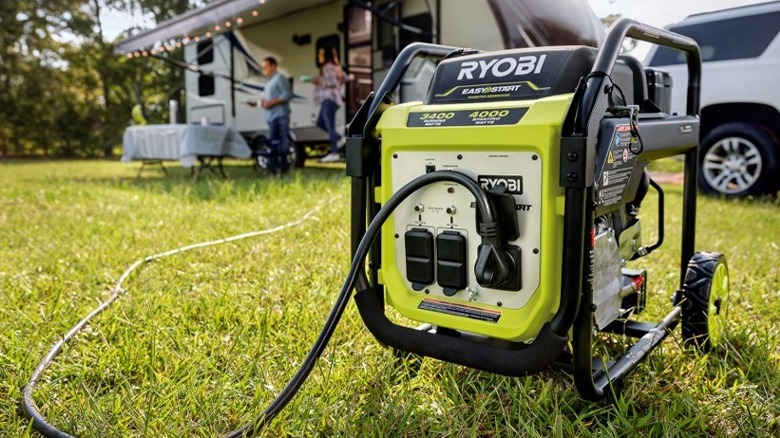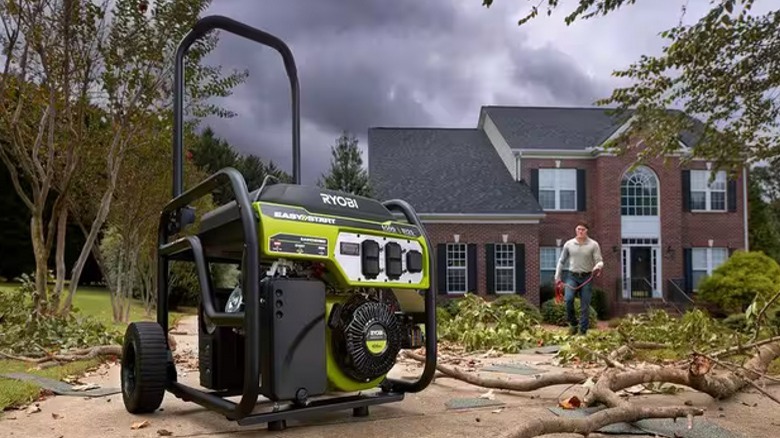Ryobi Generators: Which Is Best For Your Needs?
There are a lot of reasons why you might need a good generator. Maybe you have a cabin somewhere off the grid that needs a reliable source of power, maybe you live in an area where storms and other natural phenomena can lead to unexpected outages, or maybe you like to go camping and want the means to bring a few electronics into the great outdoors.
The Home Depo-affiliated brand Ryobi makes a range of power stations and portable generators. While Ryobi isn't always known for making the most powerful products, its competitive pricing has helped it to develop a reputation as one of the best power tool brands on the market. This price-to-performance ratio can make Ryobi's generators a very attractive option for those looking to get their hands on a backup power source. However, choosing the right generator for your needs can be tricky.
A house needs significantly more power than a camper, and numerous factors might change the size of the generator that you need. Running an HVAC system, for instance, can be a major drain on the power, especially in larger buildings. Even the number of appliances can affect the amount of power that you need your generator to produce. With that in mind, here's a quick rundown on how to choose the Ryobi generator that's best for your needs.
Power stations are good for camping and short outages
Not every situation calls for a gas-powered generator. Those who are simply looking for a lightweight power source might prefer one of Ryobi's various power stations. These are especially useful for people who have already invested in Ryobi's collection of cordless power tools as they make use of the company's 18V ONE+ battery system. Rather than generating new power, they convert power from these batteries into a current that can be accessed through the conventional AC outlets on the outside of the station. The portability and versatility of these units are particularly useful for camping or short, unexpected power outages where you just need to be able to run a handful of devices for a few hours.
Small units, like Ryobi's 150-watt Battery Power Source and Charger Kit, are good enough for an extra couple of lights or to charge a laptop. But you're going to want either the 40V or 18V 1800-watt Power Station if you're looking to power a refrigerator, plug in a space heater, or turn on a TV. These also come with extra features like a built-in light and an app for monitoring energy usage and battery depletion. The biggest downside to these is that the batteries can be difficult to recharge once they're out of juice. They're also probably not strong enough to run your whole house.
2,300 watts can keep the lights on
When it comes to true gas-powered generators, Ryobi offers generators with four levels of power output at the time of writing: 2,300-watt, 3,600-watt, 4,000-watt, and 6,500-watt. Starting at the bottom, there are two different models of 2,300-watt generators. Both of them are inverter generators. These are quieter and more fuel-efficient than conventional generators, but they tend to be more expensive in relation to the amount of energy they can produce. The key difference between these two models is that the more expensive one has a built-in electric start system, so users can use a Ryobi ONE+ battery to start their generator rather than having to fuss with a rip cord.
Both of them have 2,300 watts of starting power and 1,800 watts of running power. This is plenty of power to keep the lights on. You can even comfortably keep your refrigerator on, turn on the TV, or even run a space heater to keep warm. It's probably not enough to keep your entire house going, though. You're going to have to be very careful about the number of appliances that you plug in at the same time. You'll need to check the wattage usage of each device and be careful not to overdraw from the generator's output capacity. According to Ryobi's website, you can also "conveniently monitor power consumption, fuel level, and run-time remaining, as well as shut off your generator remotely with the GENControl app on your Apple or Android smartphone" with both of these units.
3,600 to 4,000 watts can run a few extra appliances
So a 2,300-watt unit can run a couple of appliances, but what about some of the more medium-sized generators? Ryobi sells two mid-range portable generators, a 3,600-watt conventional generator and a 4,000-watt inverter generator. The difference between the power output offered by these is minimal, so they should be able to handle a similar power load. The conventional generator delivers 4,500 starting watts and 3,600 running watts, while the inverter unit delivers 4,000 starting watts and 3,400 running watts.
These power outputs should be able to handle most appliances in your household. According to Home Depot, a refrigerator runs ~600 to 800 watts, an element on an electric range takes ~2,500 watts, a television takes ~100 to 300 watts, and a PC ranges from ~500 to 2,000 watts. These generators are also powerful enough to manage a water pump and might even be able to manage central air-conditioning in smaller homes, though they will still struggle to keep everything going at once. You'll have to be selective with which appliances you use, calculate their power consumption, and map out how many of them you can have going at a given time. Even so, these generators give significantly more headroom than the 2,300-watt models and so there they offer a lot more flexibility.
6,500 watts can handle AC, but not a furnace
The largest unit Ryobi makes is a 6,500-watt conventional generator. It delivers 8,125 starting watts and 6,500 running watts. Since this is about three times the size of the smaller units, you might think that it's strong enough to run your HVAC system, but the truth is that it still might not be enough to power central heat. Home Depot states that while central air conditioning only needs 2,000 to 4,000 watts, a typical electric furnace requires between 5,000 to 25,000 watts just to run. This means it's unlikely that even Ryobi's largest portable generator will be able to handle the power required to fully heat your home. For that, you will probably need a significantly more expensive, permanently installed house generator. Unfortunately, Ryobi doesn't make these.
That said, Ryobi's 6,500-watt unit is powerful enough to run just about everything else in your home. It can also run space heaters and even radiators if need be. So it can keep you warm in a pinch if you have the proper gear. You probably shouldn't expect it to power everything at the same time, but it can allow you to heat your water, cook your meals, and enjoy some electronic entertainment in comfort with plenty of overhead for necessities like lights and refrigeration.
It has a few other nice features as well. "An Automatic Voltage Regulator ensures reliable and consistent power while preventing damage to the generator and the devices plugged into it," Ryobi states. "The easy-access control panel has four 120V 20 amp (GFCI Protected) outlets and one 240V 30 amp Twist Lock Outlet to meet all your power needs."
